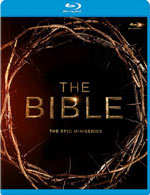

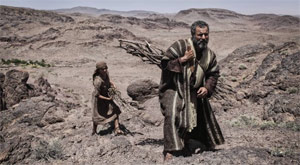
From Genesis to Revelation, The Bible: The Epic Miniseries illuminates the Bible, re-telling the stories as they unfold in the Bible, revealing new insights into these iconic characters in context of the Bible. The series will feature some of the most famous stories ever written from Noah's Ark and the Exodus to Daniel in the Lion's Den to the crucifixion and resurrection of Jesus. (Think Jam)
Any time the holiest book ever written has been translated into visual media, there's been speculation and scrutiny over its accuracy. And while many of its stories contained within its blessed pages have been interpreted visually time and time again, something on the scale as The Bible: The Epic Miniseries, hasn't quite been done before. I remember the TV channel TNT featuring solo Bible-story-themed films when I was a teen, and most of those were done on a grand scale, but the people behind this miniseries clearly have a different approach and goal in mind when making visual tales for a new generation of TV watchers.
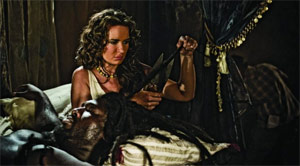
The Bible: The Epic Miniseries is ten nearly hour-long episodes that take the viewer from God's creation of the Earth on through to John's writing of Revelation. However, to pack 66 books of the Bible into a miniseries, many liberties were taken to make this undertaking "work." But many viewers will have their own opinions about what was included and excluded in the series. For example, the miniseries covers creation and Adam and Eve's fall, along with Noah's Ark, literally within the first few minutes of the first episode. The first episode, titled "The Beginning," is really all about Abraham and God's promises. Ultimately, it shows how Abraham was promised countless descendants which inevitably leads to Jesus' coming, so I can understand why the beginning is breezed over for continuity, but it's shortcuts like these that make me wonder if they couldn't have tried stretching this out into either a full-on TV series or a longer miniseries (although I understand a full-on TV series would be extremely costly). Because of this, you can tell while watching the series that they were trying hard to make it interesting and exciting to viewers who wouldn't normally watch something like this. As such, any chance these episodes can take to display the brutality of the times are taken. At first, it's not only jarring due to the sometimes goriness of it, but it's jarring because of how overly stylized and therefore campy it can appear. For example, when the angels aid in the destruction of Sodom, they're portrayed as warriors in soldier uniforms, red-hooded cloaks and sporting battle scars. They then, in slow motion of course, whip out a pair of swords and go slashing and stabbing through a line of people. Throughout scenes like this, the sound effects of squishing flesh and blood-spilling is heard as blood is usually seen squirting up from wounds or spraying from a blow that's been delivered. It usually pushes past what you'd typically see in a given PG-13 action movie, making some of this clearly R-rated material (but, granted, they don't show dismemberments and such, like most restricted films would). But aside from the sheer violence, it's the fact that the show focuses on these historical moments in nearly every episode as through the lens of what you might see in an action film that make it feel more gratuitous than anything. You can tell they tried hard to adapt The Bible for people who wouldn't normally read it or watch a series like this. It also leaves you wondering how much shorter this series would end up being if they weren't constantly relying on slow motion effects to manipulate the tone of a given scene.
As a whole, it probably isn't a big surprise that the miniseries doesn't really seem to find its legs until Jesus is introduced around episode 6. Characters are constantly being introduced and dismissed episode after episode (and many times within one episode), so it's tough to latch on to some of the characters. But from his birth, we're shown Jesus starting his ministry and the road that takes him to his eventual death on a cross. Diogo Morgado portrays Jesus in a very warm, soft way, which is definitely different from Jim Caviezel's more intense portrayal in The Passion of the Christ, but still Morgado does a fairly good job interpreting Christ. His appearance may adhere to some of the more iconic or idealistic depictions of Jesus a little too much, but he still does a good job bringing Jesus to the screen. Other standout performances include Darwin Shaw as Peter, and Con O'Neill as Paul. Actually, most of the main disciples turn in memorable performances, while Amber Rose Revah's Mary Magdelene feels over-stated in many moments (but more on her character later). We actually don't see Paul until the series' final episode, "Courage," and it's a rather abbreviated telling of the apostle's story -- from Christian-killer to follower of Christ. O'Neill plays Paul very intensely from the start (oddly enough, it's never mentioned that his name was Saul first before conversion). Upon realizing who his character was when he's introduced as a persecutor of Stephen, I instantly became curious as to how O'Neill would be able to portray Paul post-conversion. In the end, the series left me wanting more on Paul's character. If anything, I felt like Paul is such an important person in the rise of the modern church that more than just a portion of one episode would have been ideal for telling his story. Most Biblical tales involving Jesus end with his resurrection, so "Courage" was a particularly engaging installment of the series.
Since it's obvious that the series is trying to keep The Bible epic in appearance and scale and storytelling, there's a great deal of story-hopping throughout the episodes. Just when you feel like a story might be gaining momentum, we jump 40 or 100 years ahead to another character. In "Homeland," we get the story of Samson after the story of Jericho's fall. Samson here is presented as a bulky African American man with dreads(?!). While we all have had our Sunday School imprintings of what we have come to believe a character to look like, it's hard to believe that this is a realistic representation of him. To make matters worse, his scenes feel like something taken out of The Mummy Returns or The Scorpion King... not The Bible. The other odd but disputable storytelling liberty that really sticks out to me was the inclusion of Mary Magdelene in Jesus's ministry journey. They leave out some of Mary's pre-resurrection stories in the Bible and focus on her as having tagged along with the 12 disciples. Not only did it feel a little odd (like she was more of a groupie), but Amber Rose Revah's performance just made it seem all the more less fitting. Most of the actors in Jesus' main twelve are actually strong, convincing actors (Thomas was also solid, as was Judas), and Revah stood out too much. But, when it comes to what stories they chose to include in these ten episodes, it surprised me, not only that Noah was only briefly mentioned, but that the inspiring story of Joseph was ignored and that Jesus' time on Earth after his resurrection was shortened to just a scene or two (I was really looking forward to the story of when Jesus appears to them while fishing, for one). It's easy to point out missed opportunities or artistic liberties taken (like how it isn't until Jesus hugs Peter after the Last Supper that he gets a vision of Peter's denial), but the heart and essence of The Bible is captured without any watering down, which is a little surprising in today's social climate.
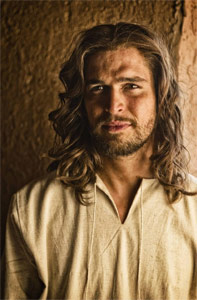
The content of The Bible is in line with how rough the Holy Book's wording actually is, but as I mentioned before, some of the violence just really feels much too gratuitous. Not only are many of the battles really bloody (especially by what one might expect from a television series...but yes, I realize times have changed dramatically), but things like slicing a lamb's throats for sacrifices are oddly focused upon seemingly just for the sake of being able to show a flood of blood spewing from the animal's neck (and several episodes feature this). Other times, slow motion, dramatic music, and blood squirting from a victim are utilized to make moments feel more "epic" and dramatic, when I have to wonder how just a straight-shooting take on it would have impacted audiences instead (in other words, do we need all the added dramatic visual elements? Or would good acting and character development be enough for viewers? There was a painful overdose of slow motion in these episodes). When John The Baptist is executed, we see a silhouette shot of his severed head being removed. It'll be shocking for younger viewers (along with David's beheading of Goliath), but they're just a couple examples of how brutal things on the screen can get. There are also a couple scenes where infants or children are murdered, which are a bit disturbing. The worst of these is when King Zedekiah's two little children are killed in front of him just before they gouge his eyes out. They cut away from the actual killing, but we see them lying dead on the ground and then the king getting his eyes squished in. Finally, there's a little sexuality with Delilah seducing Samson and David watching Bathsheba bathe, but there is no nudity or sexual acts ever actually shown, as the filmmakers clearly decided to handle such subject matter far more delicately than the violence.
I was excited to hear that Hans Zimmer had scored the miniseries, but upon watching it, I didn't find Zimmer's work standing out as much as it normally has for films of his--like Christopher Nolan's Batman trilogy, Inception, or the Pirates of the Caribbean and Sherlock Holmes series. In all fairness, however, once Jesus is introduced, Zimmer seemed to be holding the more memorable music for the Savior, and even though some cues may remind a few viewers of The Dark Knight Rises or other previous works from Zimmer, his score finally seems to really add to what we're seeing on the screen.
When all is said and done and the credits roll on the tenth chapter, I could certainly glean spiritual insights and inspiration from The Bible: The Epic Miniseries, but I couldn't help feel like some aspects just left me wanting more, while other portions felt like complete letdowns. Personally, of the Old Testament tales, I might be inclined to revisit David's story, but The Bible: The Epic Miniseries really felt like it took off when Jesus was introduced. And while I think it could have spent more time on his teachings (even as a young boy, which wasn't touched on at all), and stories from the book of Acts, there's enough shown here to educate and entertain, but most of all, inspire. And most importantly, hopefully it will inspire people to pick up the source material and read The Good Book.
- John DiBiase (reviewed: 4/13/13)
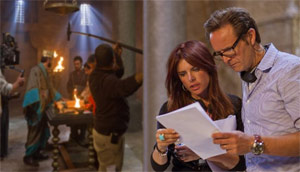
The Bible: Genesis (9:35) - This short featurette features Roma Downey and her husband Mark Burnett who executive produced the project as a labor of love to tell these stories to a new generation. Roma talks a lot about what the scope was for the project and how they picked what stories would go into the series.
Scoring The Bible (8:45) - Hans Zimmer and vocalist Lisa Gerrard teamed up for the film's score, and it's especially interesting to hear from Zimmer and the producers about this project, and how excited Downey was to actually get Zimmer to do it.
h The Cast Of The Bible (13:36) - Here we hear from the key cast throughout the series until we reach Jesus and Roma talks about how difficult it was to find the right actor for Jesus -- until they tracked down a famous actor from Portugal, Diogo Morgado. We then hear more from Morgado about the role and what he did to prepare to play Jesus.
The Creation (42:09) is an episode-long featurette about the making of the series, separated into three parts: I: The Vision and The Look, II: Production Stories, and III: Crucified & Resurrected. It's a thorough and fascinating making-of featurette. Everything from stories on set (like a set collapsing after people left it) to Roma talking about being chosen to play adult Mary even though she hadn't been planning on starring in the series, is covered.
Believing in Miracles (7:59) - Maya Angelou herself opens up this featurette talking about what The Bible means to her. Roma and the crew then share about some real miracles that happened on set -- including how the wind rushed during the scene where Jesus talks to Nicodemus, which wasn't planned and was a real gust of wind that happened on cue (If you look closely at the scene, you can catch a hint of surprise on Diogo's face). But most of this short featurette shows some on-set filming and Roma and Mark talking about the project.
The Bible: Visual Effects (3:05) is a montage of before-and-after effects shots. Some were obvious in the series, while others weren't. It's actually pretty impressive.
"Mary Did You Know?" Music Video (3:41) is a music video using Mark Lowry's song "Mary Did You Know?" as it was performed in 1996 by Kenny Rogers and Wynonna, set to clips from the series from Jesus' birth till the last episode. (It's a little surprising that they chose a recording that's 17 years old for this music video, though.)
- John DiBiase, (reviewed: 4/13/13)
Disclaimer: All reviews are based solely on the opinions of the reviewer. Most reviews are rated on how the reviewer enjoyed the film overall, not exclusively on content. However, if the content really affects the reviewer's opinion and experience of the film, it will definitely affect the reviewer's overall rating.
 Sanctus Real Share Encouraging New Single, "Steady" Sanctus Real Share Encouraging New Single, "Steady"Sat, 14 Feb 2026 14:31:00 EST |
 B. Cooper Drops "L2ML (feat. Steve Means, Brandi Grimsley)" B. Cooper Drops "L2ML (feat. Steve Means, Brandi Grimsley)"Sat, 14 Feb 2026 14:20:00 EST |
 Pat Barrett Releases "Break Open" From Upcoming Live Album Pat Barrett Releases "Break Open" From Upcoming Live AlbumFri, 13 Feb 2026 19:14:00 EST |
 Trip Lee Debuts BRAG Worship EP, FOR YOUR GLORY Trip Lee Debuts BRAG Worship EP, FOR YOUR GLORYFri, 13 Feb 2026 18:55:00 EST |
 Passion Announces March 6th New Album, "Just That Good" Passion Announces March 6th New Album, "Just That Good"Fri, 13 Feb 2026 18:47:00 EST |
 KB Releases Genre-Bending New Single, "BLOOD 2" KB Releases Genre-Bending New Single, "BLOOD 2"Fri, 13 Feb 2026 18:42:00 EST |
 Les and Joyce Carlsen Declare "He's God" with New Rock Single Les and Joyce Carlsen Declare "He's God" with New Rock SingleFri, 13 Feb 2026 18:30:00 EST |
 Click here All News Headlines |
Click here All News Headlines |